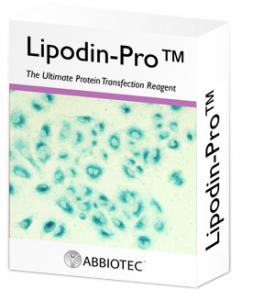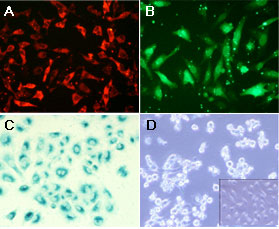 Lipodin-Pro™ is the ultimate transfection reagent that transports biologically active peptides, proteins and antibodies directly into living cells. Lipodin-Pro™ represents an alternative to nucleic acid transfection for functional studies. Lipodin-Pro™ is a lipid-based formulation that is added to the protein of interest minutes before cell delivery. Within few hours, protein activity can be observed in living or fixed cells. Regardless of serum addition, Lipodin-Pro™ is ideal for monitoring kinetics of biological activities in established cell lines and primary cells, including neurons.
Lipodin-Pro™ is the ultimate transfection reagent that transports biologically active peptides, proteins and antibodies directly into living cells. Lipodin-Pro™ represents an alternative to nucleic acid transfection for functional studies. Lipodin-Pro™ is a lipid-based formulation that is added to the protein of interest minutes before cell delivery. Within few hours, protein activity can be observed in living or fixed cells. Regardless of serum addition, Lipodin-Pro™ is ideal for monitoring kinetics of biological activities in established cell lines and primary cells, including neurons.
Protein Delivery Applications for Lipodin-Pro™
Lipodin-Pro can be used in various functional studies for cell signaling and apoptotic assays, protein-protein interaction, protein localization and compartment shuttling. When the protein is conjugated to a fluorescent dye, the functional assay can be carried out in living cells under multiple treatments with a single sample. Lipodin-Pro successfully delivered numerous proteins in a wide variety of cells: B and R-phycoerythrin, bovine serum albumin, β-galactosidase, human active caspase-3 and various immunoglobulins (unconjugated or labeled with FITC, TRITC, AlexaFluor®488 and AlexaFluor®546). Standard cell lines (CHO, COS-7, HEK-293, HeLa, Jurkat, NIH3T3) and primary cells (neurons, glial cells) were successfully assayed for Lipodin-Pro reagent.
Protein Transfection Experiments using Lipodin-Pro™.
 (A) R-phycoerythrin (1 μg) was delivered in human cervical epithelial carcinoma HeLa cells and fluorescence observed 24 h post-transfection.
(A) R-phycoerythrin (1 μg) was delivered in human cervical epithelial carcinoma HeLa cells and fluorescence observed 24 h post-transfection.
(B) An anti-Nuclear Pore Complex antibody conjugated to AlexaFluor®488 (0.5 μg) was delivered in human bronchial epithelial BEAS-2B cells and fluorescence observed 24 h post-transfection.
(C) β-galactosidase (1 μg) was delivered in human non-small cell lung carcinoma A549 cells and enzymatic activity tested 24 h post-transfection.
(D) Active human caspase-3 (15 ng) was delivered in HeLa cells and apoptotic effect observed 6 h post-transfection. Cells before transfection are shown in inset.
Lipodin-Pro™ Advantages over Current Protein Delivery Techniques
- No need for DNA cloning or nucleic acid transfection
- No chemical ligation or crosslinking
- Serum compatible, no cytotoxicity and biodegradable
- Easier 2-step protocol with ready-to-use reagents
- Deliver functionally active protein within hours
- Higher delivery efficiency with stable cell lines and primary cells
How Lipodin-Pro™ Works
Lipodin-Pro is a formulation of lipids able to capture proteins through electrostatic and hydrophobic interactions. There is no need for covalent linkage procedure, Lipodin-Pro is directly mixed with the protein of interest for 10 minutes. The mixture is then added to the cells in culture, the lipid-protein complexes are internalized by the cells and the proteins are released into the cytoplasm within few hours without any cytotoxicity. The optimized formulation of Lipodin-Pro is fully biodegradable maintaining high cell viability upon delivery. The proteins delivered inside the cells with Lipodin-Pro retain both their structure and function whether peptides, proteins or antibodies are used.
How to Order Lipodin-Pro™
| Product | Unit | Cat. No. |
|
| Lipodin-Pro™ | 25 rxn | 500100 |
|
|
| 100 rxn | 500110 |
|
Contents and Storage
Lipodin-Pro™ protein transfection reagent is offered in 25- and 100-reaction kits, for which a reaction is defined as the amount of reagents required to deliver 2 μg of R-phycoerythrin positive control protein to cells in one well of a 12-well plate. The number of reactions varies depending on the plate size and type of macromolecule to deliver. Each kit includes the Lipodin-Pro protein transfection reagent, a R-phycoerythrin protein solution as positive control, and a comprehensive instruction manual. Kit components are shipped at room temperature and stored at 4°C upon receiving. Components are guaranteed stable for one year.
Citations
Liu R. et al. 2021. Cell Metabolism. 33(10): 2076-2089. PMID 34343500. Innate immune response orchestrates phosphoryl pyrophosphate synthetases to support DNA repair.
Mellert K. et al. 2012. PLoS ONE. 7(12): e52473. PMID# 23285056
Lin T et al. 2012. Urologic Oncology. 30(3):339-345. PMID# 20843711
Todd G et al. 2011. Patent EP 2624846 A2
Kim SY et al. 2011. Apoptosis. 16(8):795-807. PMID# 21630016
For research use only, not for diagnostic or therapeutic procedures.




